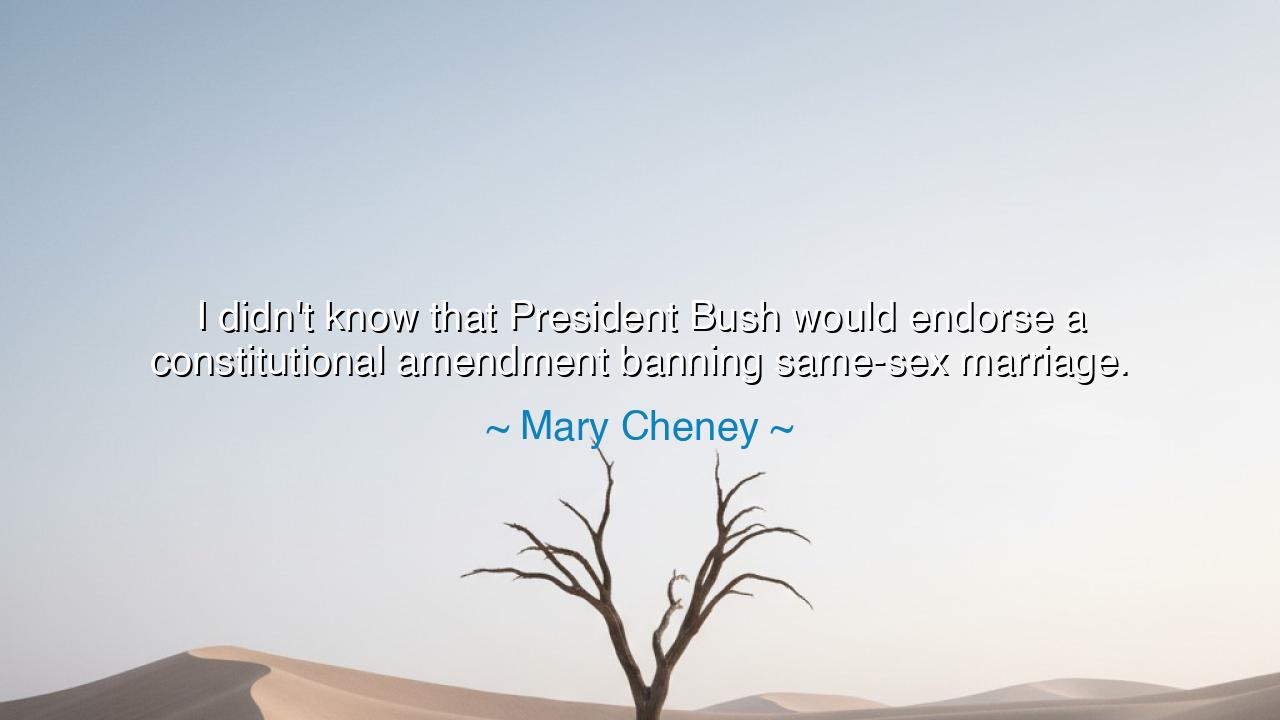
I didn't know that President Bush would endorse a constitutional
I didn't know that President Bush would endorse a constitutional amendment banning same-sex marriage.






In the tapestry of history, there are moments when expectations are shattered, when individuals are confronted with the incongruity between what they believe to be true and what the world reveals to them. It is in such moments that the heart trembles, and the soul is forced to reconsider the very nature of trust and loyalty. Mary Cheney speaks to us in such a moment of personal revelation: "I didn't know that President Bush would endorse a constitutional amendment banning same-sex marriage." These words, filled with betrayal and disillusionment, capture the painful clash between public figures’ promises and their actions, a clash that shakes the foundation of one’s faith in both politics and personal relationships.
Throughout history, there have been many instances where individuals have placed their trust in those who held power, only to have that trust broken by the reality of political maneuvering. Mary Cheney, a woman whose life and identity as a lesbian were known to many, found herself in a position where the actions of her own father, Dick Cheney, who held a prominent political office under President George W. Bush, contradicted the values she had hoped he would uphold. The amendment in question was a move to constitutionally define marriage as between a man and a woman, thus barring same-sex marriage from legal recognition. For Cheney, this moment was a deep rupture, one that echoes throughout history when a person is forced to confront the complexities and contradictions of loyalty and belief.
The ancients too, knew of such dilemmas, for they understood that power, whether political or familial, often carries within it seeds of conflict. Take, for instance, the tragic story of Antigone, the sister of Polynices, who defied the orders of her uncle, King Creon, because she believed in a higher moral law—the law of the gods. Her loyalty to family and duty led her to oppose the very authority that sought to govern her actions. In the same way, Cheney’s words speak of the tension between family loyalty and the actions of those in power. It is a timeless struggle—between one’s personal beliefs and the collective decisions made by those in leadership.
But the heartache Cheney felt was not solely one of familial betrayal, but of political disillusionment. The endorsement of the constitutional amendment by Bush was a public declaration of a position that left little room for compromise on the matter of same-sex marriage. It was a sharp reminder that in the world of politics, even those we trust the most can turn their backs on the principles we hold dear. The vulnerability of this realization—the recognition that one’s hopes for justice can be dashed by the weight of political expediency—reminds us of the often fickle nature of political allegiance. Mary Cheney’s words invite us to question the true alignment between the values we proclaim and the policies we enact.
This struggle between personal identity and public duty finds resonance in the story of Socrates. As he stood before the Athenian court, charged with corrupting the youth and disrespecting the gods, Socrates was forced to weigh the consequences of his actions against the laws of the land. Though he could have escaped his fate by offering a simple compromise, he chose instead to remain true to his philosophical beliefs, even at the cost of his own life. In a way, Cheney’s words echo the same challenge faced by Socrates: how does one balance the demands of personal truth with the forces of power that seek to shape our world?
The lesson that we take from Mary Cheney’s words is one of profound self-reflection and courage. When faced with political disillusionment, we must ask ourselves: how do we reconcile the values we hold dear with the actions of those in power? Loyalty is a powerful force, but it must be tempered with a clear-eyed understanding of the moral implications of our allegiances. Just as Socrates chose integrity over compromise, so must we choose to act in alignment with our values, even when it costs us the support of those we once trusted.
The actions of our leaders must always be held to the light of justice and equality. Let us not allow ourselves to be swayed by the words of those in power, but instead, let us demand that their actions reflect the truth we hold within our hearts. In the end, it is not the promises of the powerful that will sustain us, but the courage to stand firm in the face of injustice, to speak out when our values are threatened, and to remain loyal to the truth of our own identity. Only through such unwavering commitment can we hope to create a world where the ideals of equality and justice are not merely spoken of, but realized in the hearts of all.






AAdministratorAdministrator
Welcome, honored guests. Please leave a comment, we will respond soon